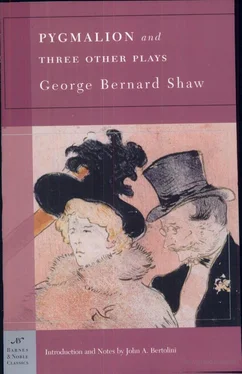In the first frenzy of microbe killing, surgical instruments were dipped in carbolic oil, which was a great improvement on not dipping them in anything at all and simply using them dirty; but as microbes are so fond of carbolic oil that they swarm in it, it was not a success from the anti-microbe point of view. Formalin [100] Solution containing formaldehyde, used as a disinfectant.
was squirted into the circulation of consumptives until it was discovered that formalin nourishes the tubercle bacillus handsomely and kills men. The popular theory of disease is the common medical theory: namely, that every disease had its microbe duly created in the garden of Eden, and has been steadily propagating itself and producing widening circles of malignant disease ever since. It was plain from the first that if this had been even approximately true, the whole human race would have been wiped out by the plague long ago, and that every epidemic, instead of fading out as mysteriously as it rushed in, would spread over the whole world. It was also evident that the characteristic microbe of a disease might be a symptom instead of a cause. An unpunctual man is always in a hurry; but it does not follow that hurry is the cause of unpunctuality: on the contrary, what is the matter with the patient is sloth. When Florence Nightingale said bluntly that if you overcrowded your soldiers in dirty quarters there would be an outbreak of smallpox among them, she was snubbed as an ignorant female who did not know that smallpox can be produced only by the importation of its specific microbe.
If this was the line taken about smallpox, the microbe of which has never yet been run down and exposed under the microscope by the bacteriologist, what must have been the ardor of conviction as to tuberculosis, tetanus, enteric fever, Maltese fever, diphtheria, and the rest of the diseases in which the characteristic bacillus had been identified! When there was no bacillus it was assumed that, since no disease could exist without a bacillus, it was simply eluding observation. When the bacillus was found, as it frequently was, in persons who were not suffering from the disease, the theory was saved by simply calling the bacillus an impostor, or pseudo-bacillus. The same boundless credulity which the public exhibit as to a doctor’s power of diagnosis was shown by the doctors themselves as to the analytic microbe hunters. These witch finders would give you a certificate of the ultimate constitution of anything from a sample of the water from your well to a scrap of your lungs, for seven-and-sixpence. I do not suggest that the analysts were dishonest. No doubt they carried the analysis as far as they could afford to carry it for the money. No doubt also they could afford to carry it far enough to be of some use. But the fact remains that just as doctors perform for half-a-crown, without the least misgiving, operations which could not be thoroughly and safely performed with due scientific rigor and the requisite apparatus by an unaided private practitioner for less than some thousands of pounds, so did they proceed on the assumption that they could get the last word of science as to the constituents of their pathological samples for a two hours cab fare.
ECONOMIC DIFFICULTIES OF IMMUNIZATION
I have heard doctors affirm and deny almost every possible proposition as to disease and treatment. I can remember the time when doctors no more dreamt of consumption and pneumonia being infectious than they now dream of sea-sickness being infectious, or than so great a clinical observer as Sydenham [101] Thomas Sydenham (1624 — 1689) English physician and pioneer in treating diseases.
dreamt of smallpox being infectious. I have heard doctors deny that there is such a thing as infection. I have heard them deny the existence of hydrophobia as a specific disease differing from tetanus. I have heard them defend prophylactic measures and prophylactic legislation as the sole and certain salvation of mankind from zymotic disease; and I have heard them denounce both as malignant spreaders of cancer and lunacy. But the one objection I have never heard from a doctor is the objection that prophylaxis by the inoculatory methods most in vogue is an economic impossibility under our private practice system. They buy some stuff from somebody for a shilling, and inject a penny-worth of it under their patient’s skin for half a-crown, concluding that, since this primitive rite pays the somebody and pays them, the problem of prophylaxis has been satisfactorily solved. The results are sometimes no worse than the ordinary results of dirt getting into cuts; but neither the doctor nor the patient is quite satisfied unless the inoculation “takes”; that is, unless it produces perceptible illness and disablement. Sometimes both doctor and patient get more value in this direction than they bargain for. The results of ordinary private-practice-inoculation at their worst are bad enough to be indistinguishable from those of the most discreditable and dreaded disease known; and doctors, to save the credit of the inoculation, have been driven to accuse their patient or their patient’s parents of having contracted this disease independently of the inoculation, an excuse which naturally does not make the family any more resigned, and leads to public recriminations in which the doctors, forgetting everything but the immediate quarrel, naively excuse themselves by admitting, and even claiming as a point in their favor, that it is often impossible to distinguish the disease produced by their inoculation and the disease they have accused the patient of contracting. And both parties assume that what is at issue is the scientific soundness of the prophylaxis. It never occurs to them that the particular pathogenic germ which they intended to introduce into the patient’s system may be quite innocent of the catastrophe, and that the casual dirt introduced with it may be at fault. When, as in the case of smallpox or cowpox, the germ has not yet been detected, what you inoculate is simply undefined matter that has been scraped off an anything but chemically clean calf suffering from the disease in question. You take your chance of the germ being in the scrapings, and, lest you should kill it, you take no precautions against other germs being in it as well. Anything may happen as the result of such an inoculation. Yet this is the only stuff of the kind which is prepared and supplied even in State establishments: that is, in the only establishments free from the commercial temptation to adulterate materials and scamp precautionary processes.
Even if the germ were identified, complete precautions would hardly pay. It is true that microbe farming is not expensive. The cost of breeding and housing two head of cattle would provide for the breeding and housing of enough microbes to inoculate the entire population of the globe since human life first appeared on it. But the precautions necessary to insure that the inoculation shall consist of nothing else but the required germ in the proper state of attenuation are a very different matter from the precautions necessary in the distribution and consumption of beefsteaks. Yet people expect to find vaccines and antitoxins and the like retailed at “popular prices” in private enterprise shops just as they expect to find ounces of tobacco and papers of pins.
THE PERILS OF INOCULATION
The trouble does not end with the matter to be inoculated. There is the question of the condition of the patient. The discoveries of Sir Almroth Wright [102] Noted immunologist and a friend of Shaw (1861 — 1947); partial model for Doctor Ridgeon in the play.
have shewn that the appalling results which led to the hasty dropping in 1894 of Koch’s tuberculin [103] German bacteriologist and Nobel laureate Robert Koch (1843 — 1910) developed tuberculin, a substance to diagnose tuberculosis.
were not accidents, but perfectly orderly and inevitable phenomena following the injection of dangerously strong “vaccines” at the wrong moment, and reinforcing the disease instead of stimulating the resistance to it. To ascertain the right moment a laboratory and a staff of experts are needed. The general practitioner, having no such laboratory and no such experience, has always chanced it, and insisted, when he was unlucky, that the results were not due to the inoculation, but, to some other cause: a favorite and not very tactful one being the drunkenness or licentiousness of the patient. But though a few doctors have now learnt the danger of inoculating without any reference to the patient’s “opsonic index” [104] Measurement of the amount of opsonin in the blood; opsonin is a constituent of the blood that helps phagocytes (such as white blood cells) destroy disease.
at the moment of inoculation, and though those other doctors who are denouncing the danger as imaginary and opsonin as a craze or a fad, obviously do so because it involves an operation which they have neither the means nor the knowledge to perform, there is still no grasp of the economic change in the situation. They have never been warned that the practicability of any method of extirpating disease depends not only on its efficacy, but on its cost. For example, just at present the world has run raving mad on the subject of radium, which has excited our credulity precisely as the apparitions at Lourdes excited the credulity of Roman Catholics. Suppose it were ascertained that every child in the world could be rendered absolutely immune from all disease during its entire life by taking half an ounce of radium to every pint of its milk. The world would be none the healthier, because not even a Crown Prince — no, not even the son of a Chicago Meat King, could afford ford the treatment. Yet it is doubtful whether doctors would refrain from prescribing it on that ground. The recklessness with which they now recommend wintering in Egypt or at Davos to people who cannot afford to go to Cornwall, and the orders given for champagne jelly and old port in households where such luxuries must obviously be acquired at the cost of stinting necessaries, often make one wonder whether it is possible for a man to go through a medical training and retain a spark of common sense.
Читать дальше












